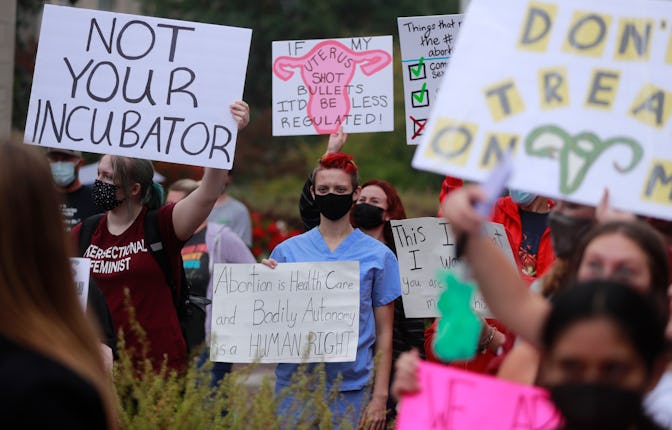Texas’s infamous abortion law might go to the Supreme Court — again
The Biden administration is trying a new tactic to block the law, which essentially turns private citizens into abortion-policing bounty hunters.

In September, Texas Gov. Greg Abbott (R) signed two draconian anti-abortion laws, including S.B.8, which together effectively banned abortion overnight. Ever since, abortion advocates both within the state and nationwide have been hard at work to restore people’s rights. Now, the Supreme Court is considering taking up Texas’s abortion law for a second time, following a direct appeal from the Department of Justice.
Texas’s abortion bans have been challenged by multiple entities. Not only did a collective of nonprofits file lawsuits, but the Justice Department also tried suing to block Texas’s ban. On Oct. 6, there seemed to be some hope, after U.S. District Judge Robert Pitman blocked the state’s ban on abortions after a fetal heartbeat is detected. But last week, the Fifth U.S. Circuit Court of Appeals in Texas ruled that the legislation banning abortions after a fetal heartbeat is detected can remain in play.
In response, the Justice Department requested that the Supreme Court review the Fifth Circuit’s decision. Within its request, the Justice Department invoked Roe v. Wade, stating, “For half a century, this court has held that ‘a state may not prohibit any [person] from making the ultimate decision to terminate [their] pregnancy before viability.’” The DOJ argued that Texas knowingly went against the Supreme Court’s Roe decision.
For a quick review: Fetal heartbeats can be found as early as six weeks, which is often just two weeks after someone misses their first period. That means that at this point, most people don’t even know they’re pregnant yet. While numerous states have tried to pass so-called heartbeat bills before, they were considered pre-viability abortion bans and struck down. Under Roe v. Wade, states can only prohibit abortions after fetal viability.
Along with that, the Justice Department pointed to the most horrific aspect of Texas’s abortion ban. Rather than looking to the state of Texas to police abortion providers, S.B.8 allows private citizens to sue anyone helping people access abortions. To be clear, that includes not only abortion providers, but also anyone who helps out with covering costs, providing rides, or otherwise facilitating the process. If the lawsuit is successful, the person who sued can receive up to $10,000.
“Rather than forthrightly defending its law and asking this court to revisit its decisions, Texas took matters into its own hands by crafting an ‘unprecedented’ structure to thwart judicial review,” the Justice Department wrote, referring to Texas’s method of putting the onus on private citizens to police the law rather than the government. “To avoid pre-enforcement suits against state officials, Texas ‘delegated enforcement’ of the law ‘to the populace at large’ in a system of private bounties.”
Unfortunately, taking the case before the Supreme Court may not be the saving grace that many want. Right now, conservatives have a 6-3 majority on the Supreme Court, and they’re unlikely to do much about what’s going on in Texas. The court already punted on the measure last month, letting it go into effect but setting the stage for the Biden administration to try this new legal strategy. And given that Texas’s abortion ban has had disastrous impacts on its most vulnerable communities, including low-income people and communities of color, it’s clear that every possible avenue to get this law struck down must be pursued.